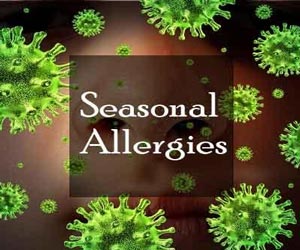- Home
- Editorial
- News
- Practice Guidelines
- Anesthesiology Guidelines
- Cancer Guidelines
- Cardiac Sciences Guidelines
- Critical Care Guidelines
- Dentistry Guidelines
- Dermatology Guidelines
- Diabetes and Endo Guidelines
- Diagnostics Guidelines
- ENT Guidelines
- Featured Practice Guidelines
- Gastroenterology Guidelines
- Geriatrics Guidelines
- Medicine Guidelines
- Nephrology Guidelines
- Neurosciences Guidelines
- Obs and Gynae Guidelines
- Ophthalmology Guidelines
- Orthopaedics Guidelines
- Paediatrics Guidelines
- Psychiatry Guidelines
- Pulmonology Guidelines
- Radiology Guidelines
- Surgery Guidelines
- Urology Guidelines
In order to tackle seasonal allergies: Nip them in bud

Spring means flower buds and blooming trees — and if you're one of the millions of people who have seasonal allergies, it also means sneezing, congestion, a runny nose and other bothersome symptoms. Seasonal allergies — also called hay fever and allergic rhinitis — can make you miserable. But before you settle for plastic flowers and artificial turf, try these simple strategies to keep seasonal allergies under control.
Reduce your exposure to allergy triggers
To reduce your exposure to the things that trigger your allergy signs and symptoms (allergens):
- Stay indoors on dry, windy days. The best time to go outside is after a good rain, which helps clear pollen from the air.
- Delegate lawn mowing, weed pulling and other gardening chores that stir up allergens.
- Remove clothes you've worn outside and shower to rinse pollen from your skin and hair.
- Don't hang laundry outside — pollen can stick to sheets and towels.
- Wear a pollen mask if you do outside chores.
Take extra steps when pollen counts are high
Seasonal allergy signs and symptoms can flare up when there's a lot of pollen in the air. These steps can help you reduce your exposure:
- Check your local TV or radio station, your local newspaper, or the Internet for pollen forecasts and current pollen levels.
- If high pollen counts are forecasted, start taking allergy medications before your symptoms start.
- Close doors and windows at night or any other time when pollen counts are high.
- Avoid outdoor activity in the early morning when pollen counts are highest.
Keep indoor air clean
There's no miracle product that can eliminate all allergens from the air in your home, but these suggestions may help:
- Use the air conditioning in your house and car.
- If you have forced air heating or air conditioning in your house, use high-efficiency filters and follow regular maintenance schedules.
- Keep indoor air dry with a dehumidifier.
- Use a portable high-efficiency particulate air (HEPA) filter in your bedroom.
- Clean floors often with a vacuum cleaner that has a HEPA filter.
Try an over-the-counter remedy
Several types of nonprescription medications can help ease allergy symptoms. They include:
- Oral antihistamines. Antihistamines can help relieve sneezing, itching, a runny nose and watery eyes. Examples of oral antihistamines include loratadine (Claritin, Alavert), cetirizine (Zyrtec Allergy) and fexofenadine (Allegra Allergy).
- Decongestants. Oral decongestants such as pseudoephedrine (Sudafed, Afrinol, others) can provide temporary relief from nasal stuffiness. Decongestants also come in nasal sprays, such as oxymetazoline (Afrin) and phenylephrine (Neo-Synephrine). Only use nasal decongestants for a few days in a row. Longer-term use of decongestant nasal sprays can actually worsen symptoms (rebound congestion).
- Nasal spray. Cromolyn sodium nasal spray can ease allergy symptoms and doesn't have serious side effects, though it's most effective when you begin using it before your symptoms start.
- Combination medications. Some allergy medications combine an antihistamine with a decongestant. Examples include loratadine-pseudoephedrine (Claritin-D) and fexofenadine-pseudoephedrine (Allegra-D).
Rinse your sinuses
Rinsing your nasal passages with saline solution (nasal irrigation) is a quick, inexpensive and effective way to relieve nasal congestion. Rinsing directly flushes out mucus and allergens from your nose.
Look for a squeeze bottle or a neti pot — a small container with a spout designed for nasal rinsing — at your pharmacy or health food store. Use water that's distilled, sterile, previously boiled and cooled, or filtered using a filter with an absolute pore size of 1 micron or smaller to make up the saline irrigation solution. Also be sure to rinse the irrigation device after each use with similarly distilled, sterile, previously boiled and cooled, or filtered water and leave open to air-dry.
Interested in alternative treatments? Consider these
A number of natural remedies have been used to treat hay fever symptoms. Treatments that may help include extracts of the shrub butterbur and spirulina (a type of dried algae). However, the benefits and safety aren't clear.
Some people claim acupuncture can help with seasonal allergy symptoms. There's some evidence that acupuncture works, and there's little evidence of harm.
Talk to your doctor before trying alternative treatments.
When home remedies aren't enough, see your doctor
For many people, avoiding allergens and taking over-the-counter medications is enough to ease symptoms. But if your seasonal allergies are still bothersome, don't give up. A number of other treatments are available.
If you have bad seasonal allergies, your doctor may recommend that you have skin tests or blood tests to find out exactly what allergens trigger your symptoms. Testing can help determine what steps you need to take to avoid your specific triggers and identify which treatments are likely to work best for you.
For some people, allergy shots (allergen immunotherapy) can be a good option. Also known as desensitization, this treatment involves regular injections containing tiny amounts of the substances that cause your allergies. Over time, these injections reduce the immune system reaction that causes symptoms. For some allergies, treatment can be given as tablets under the tongue.

Disclaimer: This site is primarily intended for healthcare professionals. Any content/information on this website does not replace the advice of medical and/or health professionals and should not be construed as medical/diagnostic advice/endorsement or prescription. Use of this site is subject to our terms of use, privacy policy, advertisement policy. © 2020 Minerva Medical Treatment Pvt Ltd